|
EMC
explains sewer system upgrade
[MARCH
13, 2001]
At
a public hearing Monday night at City Hall, representatives of Environmental
Management Corporation explained their proposal for a sewer system upgrade and
fielded questions about odor, seepage and health hazards.
|
|
Carl
Alsbach, EMC project manager, said the wastewater treatment project is designed
to meet new permit requirements, address safety issues and provide more
treatment capacity. The city must renew its permit in the fall, and design
standards, including limits for ammonia discharge, have become stricter since
the last review.
Alsbach
said all elements of the sewage system have reached or exceeded design capacity.
The flow during the three lowest flow months of the year, for example, should
not exceed 80 percent but is at 88 percent. No violations have yet occurred, but
concentration of waste has increased significantly in the last three years.
Based
on construction, operation and maintenance costs, Joe Pisula of Donohue &
Associates engineering firm recommended a single-stage activated sludge
processor with primary clarifiers. Alsbach likened a primary clarifier to a big
settling tub; the remaining waste then goes into aeration, where it is
biologically broken down.
Estimated
initial cost of the project is $10.5 million. To pay this cost, the city will
use sewer reserve funds, apply for an Illinois First grant and seek an Illinois
Environmental Protection Agency (IEPA) low-interest loan.

If
the city borrowed $12 million and repaid all of it from charges to residential
customers, the monthly sewer rate would jump $6.42, from $11 to $17.42. However,
Alsbach said several factors are expected to lower that figure. First, the
amount of the loan is expected to be lower, and further cost savings are being
sought. Second, commercial and industrial users will incur some of the cost
increase.
Third,
Lincoln and Logan Correctional Centers will pay some of the bill. Following a
study that showed the two facilities produce 40 percent of the waste load, the
Department of Corrections committed to lowering the prisons’ concentration of
waste and to paying a penalty if they exceed limits, Mayor Joan Ritter said. The
city and Department of Corrections are negotiating how much of the cost the DOC
will bear. The city must determine rate increases before it gets approval for
the project. By that time the DOC share must be agreed on.
Questions
from the public concerned seepage, odor and health hazards. Roger Bay, president
of Lincoln Lakes Condo Association, asked about lining the nearby sludge lagoon
with a membrane to prevent seepage. Pisula said an impermeable clay liner is
preferable because a membrane may be punctured during cleaning. Grant Eaton,
treatment plant manager, said the lagoon is currently clay lined.
[to top of
second column in this article]
|

Alsbach
emphasized that to meet environmental standards the berm containing the lagoon
will be raised above the 100-year flood level. The IEPA, in its preliminary
report, found no significant environmental impact of the waste treatment
project.
Acknowledging
that any wastewater treatment plant creates an odor, Alsbach said he cannot
predict whether it will increase or decrease. Pisula said odor control
facilities could nearly double the cost of the project.
Eaton
said a major cause of odor is Lincoln’s combined sewer system, which connects
storm sewers with sanitary sewers for wastewater. In dry weather when the flow
of water is slow, waste decays in the six and seven foot sewers, causing odor.
He said it is impracticable to flush the system because doing so would require
tens of thousands of gallons of water.
The
odor does not indicate a threat to health, according to Alsbach. Hydrogen
sulfide, the "rotten egg" odor, can be smelled at concentrations much
lower than the IEPA has determined to be a health hazard.
Alsbach
said the wastewater treatment project is a 20-year plan, assuming population
grows by one-half percent per year and there is some commercial growth. The
long-range plan includes repairing four pump stations: Jefferson Street,
Singleton, Lincolnwood and South Plant.
When
possible, the project incorporates existing facilities. Pisula said aeration
tanks installed in 1977 and upgraded in 1992 are in good shape and will be used.
The rock trickling filter, which dates from 1935, will be used for storage
tanks.
Alsbach
said the sewage treatment system must be improved to protect jobs and city
revenues. If the city violates ammonia discharge limits, the IEPA could stop new
housing or industry from hooking onto the sewer system.
Anyone wishing
to comment on the sewage treatment proposal has 15 days from March 12 to submit
a written response to the IEPA.
[Lynn
Spellman]

|
|
ILLINI
BANK
2201
Woodlawn Rd. in Lincoln
1-888-455-4641 or 735-5400
Ask for Terry Lock or Sharon Awe
Mortgage
Refinancing
Ag Lines of Credit
Low Auto Rates
Free Checking - Debit Card
Money Market Index Account |
Claire's
Needleworks
and Frame Shop
"We
Frame It All"
On the square
217-732-8811
M-F 10-5 Sat 10-4
cmstitches@aol.com |
Tell
a friend about
Lincoln Daily
News.com |
|
|
|
Pink
Shutter's grand opening is Thursday
[MARCH
13, 2001]
The
Pink Shutter Thrift Shop will celebrate their relocation with a 1 p.m.
ribbon-cutting and a grand opening from 1 to 3 p.m. on Thursday, March 15, at
their new location, 114 N. McLean St.
|
|
The
Pink Shutter, owned and operated by the Abraham Lincoln Memorial Hospital
Auxiliary, has been in operation since 1962.
The
Pink Shutter’s new location offers many more display areas and is closer to
the main shopping area of Lincoln. A special feature is the
handicapped-accessible parking area at the rear of the store. Also, this area is
much more convenient for people dropping off their donations.
All funds
generated from sales at the Pink Shutter Thrift Shop are used for the auxiliary’s
present hospital pledge — a birthing room in the new Obstetrics Department.
[News
release]
|

|
|

|
|
|
Sumrall has expanded library circulation and
non-print collections
[MARCH
12, 2001]
Richard
Sumrall takes justifiable pride in building additions, increased circulation
figures and expansion of non-print materials during his tenure as director of
Lincoln Public Library.
|
|
An
open house Sunday, March 11, at the library celebrated Sumrall’s 10 years of
service to the Lincoln community. "He's the best librarian we've ever
had," said trustee Eileen Morris. "He's good with people and very
civic-minded."
During
Sumrall's tenure circulation has increased from about 72,000 items per year in
1991 to nearly 112,000 in 2000. Non-print formats now include books on tape,
videos, CD-ROMs for adults and children, and electronic and online databases.
Installation of a wireless system for computers has increased efficiency and
saved taxpayers’ money, he reported.

Sumrall’s
philosophy of library service is three-pronged. "The library should be the
first resource for any person in the community, whether it be for ready
reference or for lifelong learning," he said. Second, it should be
"the preschooler’s door to learning and reading." And third, it
should provide a fun place for readers who enjoy popular materials.
A
hands-on administrator, Sumrall works in reference and at the circulation desk
in addition to his administrative duties. Working on the floor enables him to
keep in touch with patrons and to understand working conditions of the staff, he
said.
During
Sumrall’s tenure the library has experienced major changes in institutional
autonomy, facilities and collection.
Soon
after his arrival trustees and staff worked with Lincoln city government to pass
a referendum that transformed the city library into a public library district.
As a result, trustees are now elected instead of appointed by the mayor, making
the library more directly responsible to voters.
In
March 1995 the Annex officially opened. The collection and services had outgrown
the Carnegie building, Sumrall said. The Annex approximately doubled available
space and made possible two more rooms for public meetings, one in the Annex and
the Donna Pegram Meeting Room in the former children’s library. The Pegram
Room accommodates 110 people and has a kitchen for serving refreshments.
Also
in 1995 a handicapped entrance was added at the rear of the Carnegie building.
Subsequently, extensive work restored the turn-of-the-century elegance of the
building, including repair and replacement of period tiling in the entrance, new
lighting, carpeting and paint. In addition, the stained glass dome was cleaned,
repaired and lighted.
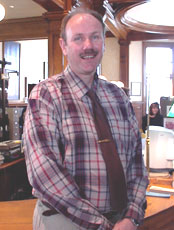
[Richard Sumrall]
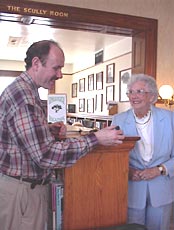
[Sumrall shows tie clasp to his mother, Laverne.]
Sumrall
arrived when many projects were in the planning stage, said Carol Frantz, vice
president of the board of trustees, and his efficiency and knowledge made the
work go smoothly. "He made the board's job easy," agreed President
Bill Vinyard.
In
building the collection, Sumrall has concentrated on nonfiction for adults and
children in order to make the library "more than just a repository for pop
fiction." He has added reference works as well as individual titles.
While
the local library has grown, so has the Rolling Prairie Library System with
which it is affiliated. Sumrall recalls when Lincoln Public Library was the only
Lincoln library cataloged by Rolling Prairie. Now the collections of Lincoln
College, Lincoln Community High School and Lincoln Elementary District No. 27
are listed in the Rolling Prairie database. Lincoln Christian College is on
another statewide database linked to Rolling Prairie’s.
With
the addition of Online Public Access Catalog (OPAC) computers, library patrons
can learn not only whether the local collection has an item and where it is but
also similar information for any title in the approximately 120 libraries in the
system. Altogether, the catalog contains over a million listings.
Besides
its Rolling Prairie affiliation, Lincoln Public Library holds institutional
membership in the American Library Association and Illinois Library Association.

Sumrall’s
professional responsibilities include coordinating the programs and services
overseen by three department supervisors: Sue Rehtmeyer in adult services, Deb
De Jarnette in circulation services and Pat Schlough in youth services. In
addition, he is in charge of collection development for adults and works closely
with Schlough on the children’s collection. He also assists reference
librarian Caroline Kiest.
Reference
questions run the gamut of information and require familiarity with many
research tools. Among questions fielded are the meaning of the MGM motto ars
gratia artis (art for art’s sake), Lincoln’s longitude and latitude (89
degrees, 22’ W, 30" and 40 degrees, 9’ N, 47"), and the original
symbol for Kellogg’s Sugar Frosted Flakes (Tony the Tiger, Katy the Kangaroo,
Elmo the Elephant and Newt the Gnu, with only Tony the Tiger surviving after one
year).
Raised
in Mobile, Ala., Richard Sumrall is the son of Laverne and the late Henry R.
Sumrall. His mother and family friend Odell Siebert attended the open house. He
has one brother, David.
In
1976 Sumrall began working at Mobile Public Library while studying history at
the University of South Alabama in Mobile. Upon earning his bachelor’s degree
in 1980 he was promoted to full time in the special collections department. In
1985 he became assistant archivist for the City of Mobile Municipal Archives
Department. He earned his Master of Library Science degree from the University
of Southern Mississippi in Hattiesburg.
[to top of
second column in this article]
|
When
he moved to Lincoln in March 1991, Sumrall said his only adjustment problem was
to the size of the city. By comparison, Mobile is twice as large as Springfield.
From the start he felt at home with the people. "People here in central
Illinois are more Southern than they are Northern," he said, quickly adding
that the statement was intended as a compliment. He said he feels lucky to have
come here: "I consider being hired here one of the luckiest breaks of my
life. I have thoroughly enjoyed and continue to enjoy living in Lincoln and
working at this library."
Noting
that American libraries are locally driven, Sumrall said that collections need
to be strong on issues of local interest. He reports being "absolutely
panic-stricken" when he first saw Lincoln’s collection on the Civil War
because in Mobile he fielded questions on that era every day. He soon learned
that the Civil War is not as hot a topic in Lincoln.
Here
Sumrall said he selects many materials on agricultural issues such as pesticides
and ground water. He believes Lincoln has an excellent collection of Abraham
Lincoln biographies and aims to buy "any book that covers any aspect of
Lincoln’s life." He also emphasized the local history and genealogy
collection, including materials on surrounding counties, especially early
Sangamon County because Logan County was formed from Sangamon.
Because
community values are important in selecting library materials, the board of
trustees suggested soon after Sumrall arrived that he get involved in community
activities. He quickly became active in the Chamber of Commerce and Kiwanis
Club. In the chamber he serves on the Government/Education and Technology
committees. He co-chairs the Main Street Economic Restructuring Committee and
this year serves on the Logan County Health Department’s Healthy Families Task
Force.

Sumrall
is a member of Risky Business investment club. He enjoys exploring both Kickapoo
Creek Park and Edward Madigan State Park. Although his reading interests
fluctuate between fiction and nonfiction, for the last few years he has
concentrated on nonfiction — especially history, science and nature.
Libraries
will never be outdated, Sumrall said, because of the educational resources they
provide. He noted that people can become overwhelmed by technology, so the
library staff is trained in its use. A frequent comment from patrons is, "I
went on the Internet, and there’s nothing there." However, staff members
can often find the needed information quickly using such resources as the 18
databases of the Illinois State Library’s First Search system.
Working
in a library requires a combination of people skills and technical expertise.
Sumrall said he looks for ability to deal effectively with the public, computer
familiarity, understanding of the Dewey Decimal classification system, and
ability to use indices and tables of contents to locate information.
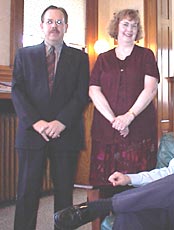
[President Bill Vinyard and trustee Eileen Morris.]
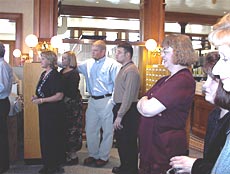
[The crowd watches a presentation by Bill Vinyard.]
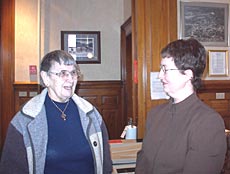
[Nell Toomey, widow of longtime board member Roy Toomey, and Carol Frantz, board
vice president.]
Although
Sumrall has occasionally received objections to content in books and magazines,
he says Lincoln is an "incredibly tolerant community" in which people
may disagree with some selections but still respect others’ right to read as a
personal choice. While he believes that no one has a right to say what others
should read, Sumrall’s personal guidelines for selection include consideration
of community standards.
Lincoln
Public Library has encountered enough problems with overdue books that Sumrall
has called on the state’s attorney’s services. Library materials are
taxpayers’ property, and the library loses several thousand dollars a year in
cost of materials and processing. The problem, he said, is not the materials
that are returned late but those that are not returned at all. Therefore late
fines are lenient: a seven-day grace period, a nickel a day per item with a
$2.50 cap and cancellation of fines for special circumstances.
Sumrall
said the library does not have a problem with vandalism and therefore needs no
security system. The low photocopy charge of 10 cents per page makes theft of
single pages less appealing, he said.
Any
patron problems caused by dividing the collection between the Carnegie building
and the Annex were short-lived. According to Sumrall, once users adjusted to
what was where they found their comfort zone either in the more popular and
noisier Annex or in the Carnegie’s quiet haven for reading and study.

In
the future Sumrall expects to "continue to expand the marriage of print and
non-print materials." He will investigate hand-held electronic readers and
downloading capacity for electronic books. In fact, Lincoln Public Library has
already participated in Stephen King’s e-book project, paying $1 per chapter
to download the book, then binding the six chapters in a volume for patron use.
Besides
embracing technological changes, Sumrall plans to continue to respond to social
issues with new materials and services. He says he looks forward to another
decade in Lincoln as successful as the first.
[Lynn
Spellman]
|
|
ABE
LINCOLN
PHARMACY
Just
inside the ALMH front door
Jim
White, R.Ph.
"We
Answer Your Medication Questions."
Click
here to visit our website |
Are
you getting enough...water?
ASK
the CULLIGAN MAN!
Click
here to learn more about hydration
or
call 217-735-4450
to learn more
about great-tasting reverse-osmosis fluoridated water. |
Our
staff offers more than 25 years of experience in the
automotive industry.
Greyhound
Lube At
the corner of Woodlawn and Business 55 No
Appointments Necessary |
|
|
|
Hartsburg
Bank celebrates 100 years
[MARCH
12, 2001]
Sunday,
March 11, was a big day for the town of Hartsburg. Over 300 people attended the
100th anniversary of the Hartsburg Bank.
|
|
The
bank served lunch at the Hartsburg Legion Hall, and at 2:30 p.m. there was a
"Looking Forward to the Future" ceremony at the bank. Bernard E.
Behrends and Jeanne (Van Gerpen) Pokorski, descendants of Berend R. Behrends and
Claus Van Gerpen, were introduced to the guests. Bernard and Jeanne then
introduced the other family members who attended the ceremony.
Before
1901 Berend R. Behrends was a successful farmer near Hartsburg, and Claus Van
Gerpen was the owner of C. Van Gerpen General Merchandise Store. On March 11,
1901, they entered into a partnership agreement to establish a private banking
enterprise called Bank of Hartsburg. The bank began with $10,000 capital stock
and each partner owning an equal share. Berend Behrends served as president, and
Claus Van Gerpen was vice president. Claus' son Daniel was named cashier. The
bank was originally on the north end of Van Gerpen General Merchandise, a
one-story brick building.

In
1913 Berend Behrends died, and the remaining partners purchased his share,
according to the provisions of the partnership agreement. The bank prospered,
and Daniel Van Gerpen, son of Claus, remained an integral part of the bank for
over 49 years. Klaas Behrends, son of Berend, was a director of the bank for 47
years.
[to top of
second column in this article]
|
The
Bank of Hartsburg remained privately owned until 1913, when it became a
state-chartered bank. Claus and Daniel Van Gerpen and Klaas Behrends applied for
the charter and were given permission to sell $30,000 of capital stock in 300
shares of $100 each. The shares were sold to 30 individuals in the Hartsburg
Community. The bank was renamed Hartsburg State Bank.
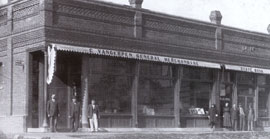
[A view of C. Van Gerpen General
Merchandise Store and Hartsburg State Bank before the bank moved to its present
location in 1927. Dr. Butler, Claus Van Gerpen and Dan Smith stand left to right
in front of the store. Posing outside the bank, left to right, are Henry Van
Gerpen, Addie Van Gerpen Bruns, Dan Van Gerpen and two unidentified men.]
The
first board of directors of Hartsburg State Bank was composed of Claus Van
Gerpen, president; James H. Butler, vice president; Daniel Van Gerpen, cashier;
David G. Gilchrist; and Klaas Behrends.
Today, Bernard
E. Behrends, grandson of Berend R. Behrends, serves as chief executive officer
of the bank. John Russell is president; Paul Leesman, vice president; Brenda
Hieronymus, cashier; Barbara Imming, assistant cashier; and Connie Sherwood,
teller.
[Kathleen
McCullough]
|
|

|
|
|
Grand
opening at Team Express
[MARCH
10, 2001]
Team
Express is having their grand opening and open house today. The business,
located at 411 Pulaski St., kicked off the day with a ribbon-cutting. There will
be door prizes and refreshments from 11 a.m. to 3 p.m. today.
|
|
Team
Express is a subsidiary of Team Electronics Super Store, Decatur, and features
retail cellular service for homes and businesses. The business is an authorized
agent for Cingular Wireless, Dish network, satellite systems, Arch paging and
Heartland paging. They also stock accessories and Nokia, Motorola and Erickson
cell phones.
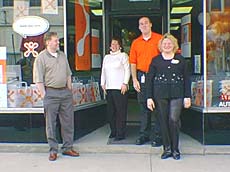
Manager
Leigh Horner and assistant manager Mandy Cook, both of Lincoln, have eight years
combined experience in cellular. While the store opened in October, they wanted
to get the business established before declaring their grand opening. They have
been busy setting up the store and becoming familiar with the company in order
to be ready to serve their customers well.
[to top of
second column in this article]
|

They
are open six days a week and by appointment on Sundays.
Cook
enthusiastically says, "We are happy to be providing Cingular wireless
service to Logan County. We want current or prospective customers to call us at
(217) 732-8962 with any questions about service they have."
[Jan
Youngquist]
|
|
|
A
local postman pays attention
to details, possibly saves a life
[MARCH
9, 2001]
Thanks
to the concern of a Lincoln postman, a Lincoln woman—we will call her Susie,
not her real name—is recovering in the hospital. Steve Jones has been
delivering Susie’s mail for about six months. He observed that every day she
collects her mail, and most days she has some to go out as well. She’s an avid
communicator.
|
|
Last
Friday, Jones noticed that Thursday’s mail was in the mailbox, no new letters
were set out, the newspaper was in the yard, and the car was in the driveway. He
rang the doorbell, but no one answered. Although he thought the situation looked
abnormal, he supposed Susie had gone out of town with friends or family.
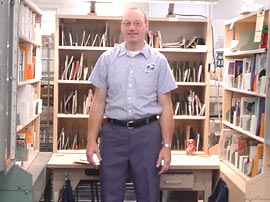
[Steve Jones recognized that things did not look right
at the home of one of his regular customers
and notified police.]
On
Saturday, Steve Jones returned to Susie’s house to deliver mail, and the scene
was unchanged. He considered calling the police at the end of his shift—about
a half hour—but it slipped his mind. After returning home for the day, Jones
and his wife took a walk. He relayed the story to his wife, and she suggested
calling the police. Because he did not want to cause unnecessary alarm, Jones
returned once more to Susie’s house, at about 5 p.m. Seeing that nothing had
changed, Jones notified police.
When
police came to investigate they found that Susie was home. She had fallen and
couldn’t get up. She was taken to Abraham Lincoln Memorial Hospital where she
was admitted and treated for injuries and dehydration.
[to top of
second column in this article]
|
Jones
called the hospital Sunday morning and learned that his patron was recovering in
the ICU. She was able to receive visitors. Not having ever actually met her
before, other than by phone, and not wanting to intrude, Jones was tentative as
he went up to see her. When he arrived he found her surrounded by family,
chatting and in lively spirits. She quickly put Jones at ease as he listened and
watched her with her family.
She
sang unending praises for all of her past and present postal carriers, saying
she had really good mailmen. Jones fondly recalls how she recounted all her past
carriers: "She named each one and the time that they served."
Jones
has been a carrier here for three years. He has almost 12 years in with the U.S.
Post Office. He transferred here from Grand Rapids, Mich., so that he and his
wife could be closer to her home: Havana.
It
is different here than it was in the larger city, but "they keep me just as
busy," quips Jones. Life in general is slower, easier going. "It's
different surroundings here. People are more personable. Things move a little
slower, and you get to talk to people more here."
This should be
a good lesson to all of us about how fortunate we are to live where we have the
time to pay attention and appreciate the people we encounter each day.
[Jean
Ann Carnley]
and
[Jan
Youngquist]
|
|
|
Library
celebrates 10th anniversary of
Richard Sumrall's service as director
[MARCH
9, 2001]
The
Lincoln Public Library's trustees and staff will host a public celebration of
the 10th anniversary of Richard Sumrall's service as the library's director. The
public is invited to the open house, which will be from 2 to 4 p.m. Sunday,
March 11, at the Carnegie building at 725 Pekin St.
|
|
Richard
Sumrall was appointed director of the Lincoln Public Library on Dec. 2, 1991.
The library's historic Carnegie building has received major renovations during
Sumrall's years as director, and the library's annex on Broadway Street opened
March 14, 1995. Recently, a Scully Room was established to hold items relative
to the county's early agricultural history.
During
Sumrall's years as director, the annual circulation has increased from 79,191
items to 110,442 items. The audio collection has been doubled, and a CD-ROM
collection added. The genealogy resources have been dramatically increased, and
a classic video collection has been inaugurated.
[to top of
second column in this article]
|
The
Lincoln Public Library is a technology leader in the Midwest, with wireless
communication and public-access computers. The library's children's program
attracts thousands of youngsters each year to summer programs, storytelling and
a host of other special events. This year the library has added an adult program
coordinator to develop book clubs, readings and other adult activities.
In addition to
his service at the library, Sumrall has been a constant contributor to community
life as a member of the board of the Chamber of Commerce, a member of Kiwanis
and a participant in many community events.
[News
release]
|
|
|
Should
county revise zoning regulations?
[MARCH
9, 2001]
Should
county zoning regulations be changed from the current five-acre parcel to one or
two acres in order to build a house, is a question that was placed on the April
agenda for the Planning and Zoning Committee of the Logan County Board.
|
|
Dave
Hepler, chairman of the committee that met Wednesday evening, said that the
board should revisit the ordinance and get input from everyone in order to
evaluate the current policy.
There
has been a certain amount of farm acreage that would be better suited to
residential use. Road construction such as that of 155 south of Lincoln has
divided farmland and made access to some land impractical. These sections of
land are no longer as desirable as farmland. It is recognized that with interest
rates down there may be potential homeowners who would benefit from the zoning
change. It would be much easier for someone to buy one or two acres to build on
than five acres.
"Anyone
who has a position on the topic should put it in writing and send it to the
County Zoning Office so that all aspects can be covered and discussed,"
Hepler said.
People
can also attend the April meeting and voice their opinions on the subject.
Other
board members in attendance at the committee meeting were Rod White and Jim
Griffin, who also voiced opinions concerning the current zoning regulations.
Harold
Juett, zoning officer, told committee members that the current position was
passed by the County Board in late 1996 after 18 months of planning and
research.
[to top of
second column in this article]
|
In
other business, the committee passed, for board approval, a request by Turris
Coal mine to change the zoning from agricultural to M3 in order to allow the
company to build an above-ground conveyor belt from the Elkhart overpass to
their mine.
Roger
Dennison, representing Turris, said that it would take approximately nine months
to obtain a permit from the state following approval from various state agencies
and public hearings.
"We
are regulated by state agencies that require compliance with pollution laws as
well as guidelines from the Department of Natural Resources. Even with the best
timetable," Dennison said, "it would be four years before the conveyor
would be in operation,"
A public
hearing is scheduled for 7:30 p.m. Tuesday, March 13, at the Hurlbut Township
office.
[Fuzz
Werth]
|
|
|
Situation
at the high school spurs violence prevention actions
[MARCH
8, 2001]
There
was a rumor about a threat called into the school yesterday morning. It was just
that, a rumor.
|
|
However,
in the afternoon a student did make a threat against someone at the high school.
That student was then in violation of his parole and was taken into custody by
police and returned to Juvenile Department of Corrections.
In
light of the recent incident in California and past situations in other schools
across the country, the Lincoln police are taking pre-emptive precautions.
"We are concerned for the safety of our students," says Lincoln Police
Chief Richard Ludolph.
There
are officers meeting with LCHS staff and faculty this morning, in addition to
assemblies for students. There were also a couple of officers stationed there as
a police presence.
[to top of
second column in this article]
|
Students
are especially vulnerable to persecution and intimidating circumstances. These
pressures can lead up to their acting out in violence.
Chief
Ludolph points out, "We need to start sticking up for those that are picked
on. Words hurt other people. In almost every one of the school violence
situations across the country, the student had been picked on."
"We're
concerned for everyone’s safety," Chief Ludolph declares. If you hear
someone make a threat, do not worry about whether they may be joking or not,
report it! Tell a teacher, staff member, adult, or call the police. The police,
state’s attorney and other trained professionals will handle it.
[Jan
Youngquist]
|
|
Back
to top
|
News
| Sports
| Business
| Rural
Review | Teaching
& Learning | Home
and Family | Weather
Milestones
| Obituaries
| Diaspora
Community | Law
& Courts | Honors
& Awards
Crosswords
| Games
The
Arts | Spiritual
Life | Health
& Fitness | Book
Look | Movies
& Videos
Letters
to the Editor | About
LDN | Corrections
Still
Waters | What's
Up With That? | Where
They Stand | the
em space | How
We Stack Up | By
the Numbers
Happy
Ads | TechLine
| Elsewhere
|
|